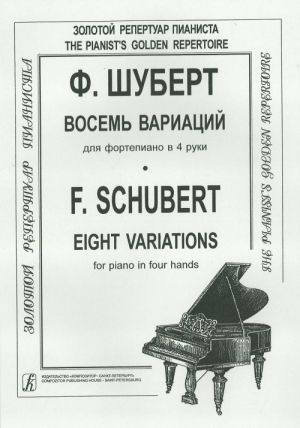Франц Шуберт (1797-1828) создал цикл из восьми вариаций для фортепиано в четыре руки, соч. 10, в сентябре 1818 года (издан в 1822-м). Цикл посвящен Людвигу ван Бетховену. Не существует доказательств встречи двух великих композиторов, принадлежавших к разным поколениям. Однако неоспоримы свидетельства восхищенного и почтительного отношения молодого Шуберта к своему великому современнику. Друг Шуберта Йозеф Шпаун писал: "Шуберт считал бы себя счастливым, если бы смог сблизиться с Бетховеном; но Бетховен в последние годы своей жизни был очень мрачен и неприступен" (последнее обстоятельство объясняется во многом глухотой мастера, значительно усилившейся к концу жизни). Существует также и свидетельство биографа Бетховена Антона Шиндлера, сообщавшего о подробном знакомстве композитора в феврале 1827 года с песнями Шуберта и об уважении, которым проникся Бетховен к таланту молодого коллеги.
Восемь вариаций Шуберта для фортепиано в четыре руки - музыкальное свидетельство преклонения 21-летнего Шуберта перед гением признанного мастера - одно из наиболее заметных произведений классического фортепианного четырехручного репертуара.
Franz Schubert (1797-1828) composed the cycle of eight variations for piano in four hands op. 10 in September, 1818 (published in 1822). The cycle is dedicated to Ludwig van Beethoven. There are no evidences of these representatives of different generations to have ever met. However, there is no doubt of Schubert's true worship and admiration of his elder colleague.
Schubert's friend Joseph Spaun once wrote, that Schubert would have considered himself the happiest man, if he could get acquainted with Beethoven. Alas, the great master was very gloomy and haughty during the last years of his life, which was partially the result of his deafness, increasing and seizing the great composer.
Simultaneously there exists evidence of Beethoven's biographer Anton Schindler, that in February, 1827, Beethoven studied Schubert's songs and really enjoyed them sincerely, uttering true respect to the young composer's genius.
Eight Variations for Piano in four hands by Franz Schubert is the confirmation of the adoration expressed by Schubert (being only twenty-one that time) in honour of the truly recognized genius of Beethoven. As for the practice concerning this composition there may be adduced Shakespeare's lines from "Julius Caesar": "How many ages hence shall this our lofty scene be acted o'er, in states unborn and accents yet unknown".
Franz Schubert (1797-1828) composed the cycle of eight variations for piano in four hands op. 10 in September, 1818 (published in 1822). The cycle is dedicated to Ludwig van Beethoven. There are no evidences of these representatives of different generations to have ever met. However, there is no doubt of Schubert's true worship and admiration of his elder colleague.
Schubert's friend Joseph Spaun once wrote, that Schubert would have considered himself the happiest man, if he could get acquainted with Beethoven. Alas, the great master was very gloomy and haughty during the last years of his life, which was partially the result of his deafness, increasing and seizing the great composer.
Simultaneously there exists evidence of Beethoven's biographer Anton Schindler, that in February, 1827, Beethoven studied Schubert's songs and really enjoyed them sincerely, uttering true respect to the young composer's genius.
Eight Variations for Piano in four hands by Franz Schubert is the confirmation of the adoration expressed by Schubert (being only twenty-one that time) in honour of the truly recognized genius of Beethoven. As for the practice concerning this composition there may be adduced Shakespeare's lines from "Julius Caesar": "How many ages hence shall this our lofty scene be acted o'er, in states unborn and accents yet unknown".
Frants Shubert (1797-1828) sozdal tsikl iz vosmi variatsij dlja fortepiano v chetyre ruki, soch. 10, v sentjabre 1818 goda (izdan v 1822-m). Tsikl posvjaschen Ljudvigu van Betkhovenu. Ne suschestvuet dokazatelstv vstrechi dvukh velikikh kompozitorov, prinadlezhavshikh k raznym pokolenijam. Odnako neosporimy svidetelstva voskhischennogo i pochtitelnogo otnoshenija molodogo Shuberta k svoemu velikomu sovremenniku. Drug Shuberta Jozef Shpaun pisal: "Shubert schital by sebja schastlivym, esli by smog sblizitsja s Betkhovenom; no Betkhoven v poslednie gody svoej zhizni byl ochen mrachen i nepristupen" (poslednee obstojatelstvo objasnjaetsja vo mnogom glukhotoj mastera, znachitelno usilivshejsja k kontsu zhizni). Suschestvuet takzhe i svidetelstvo biografa Betkhovena Antona Shindlera, soobschavshego o podrobnom znakomstve kompozitora v fevrale 1827 goda s pesnjami Shuberta i ob uvazhenii, kotorym proniksja Betkhoven k talantu molodogo kollegi.
Vosem variatsij Shuberta dlja fortepiano v chetyre ruki - muzykalnoe svidetelstvo preklonenija 21-letnego Shuberta pered geniem priznannogo mastera - odno iz naibolee zametnykh proizvedenij klassicheskogo fortepiannogo chetyrekhruchnogo repertuara.













